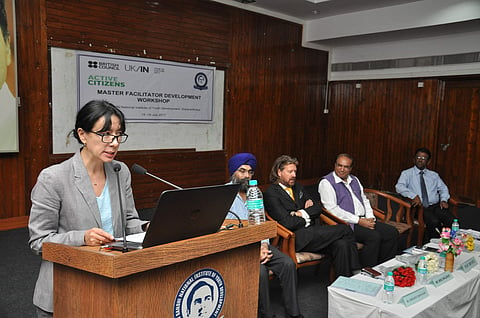

Citizenship and responsibility are two words that go hand in hand. When British Council launched the Active Citizens programme nine years ago, it was with the intention of moulding citizens in every country who are able to identify indigenous problems, create opportunities for dialogue and formulate solutions. The objectives of the programme are clear, says Mike Waldron, one of the trainers, who adds, "It is to facilitate people to identify problems in their own community, to identify the assets available, to galvanise people towards solving those problems, and at the same time, to use the skills that they develop in building trust and understanding and achieve sustainable development."
Globally, this social leadership programme is not just targeted toward young people, but as India, the 47th country to be a part of the programme, is largely a youth population, they’ve made it their priority. In India, the programme has been launched in partnership with Rajiv Gandhi National Institute of Youth Development (RGNIYD) that has ties with twenty other universities and will engage with these through NSS officers and identify appropriate candidates to be trained.
"One of the unique dimensions of the programme is that it follows a specific theory of change. We metaphorise it as a river. We try to get people to understand their own identities in the context of their culture and how they're interrelated. Then, we go down that metaphorical river to understand skills for dialogue, particularly intercultural dialogue, where they can learn and share across different platforms. Finally, we ask them to collaboratively appreciate the value in engaging with communities in which they live. The place where the river meets the ocean is where those trained individuals can deliver the programme to their communities," explains Waldron.
There have been several success stories; instances where individuals have contrived solutions to issues affecting their community. For instance, in Palestine, a group working at a refugee camp close to Bethlehem renovated a derelict bus, painted it, and turned it into a mobile library with the help of the locals. "The whole idea of 'Active Citizens' is to inspire and build the capacities of individuals who want to be change makers in their community," Waldron states. Waste management, hygiene, literacy, girls' education and conflict resolution have been some of the issues that have been identified through the programme.
